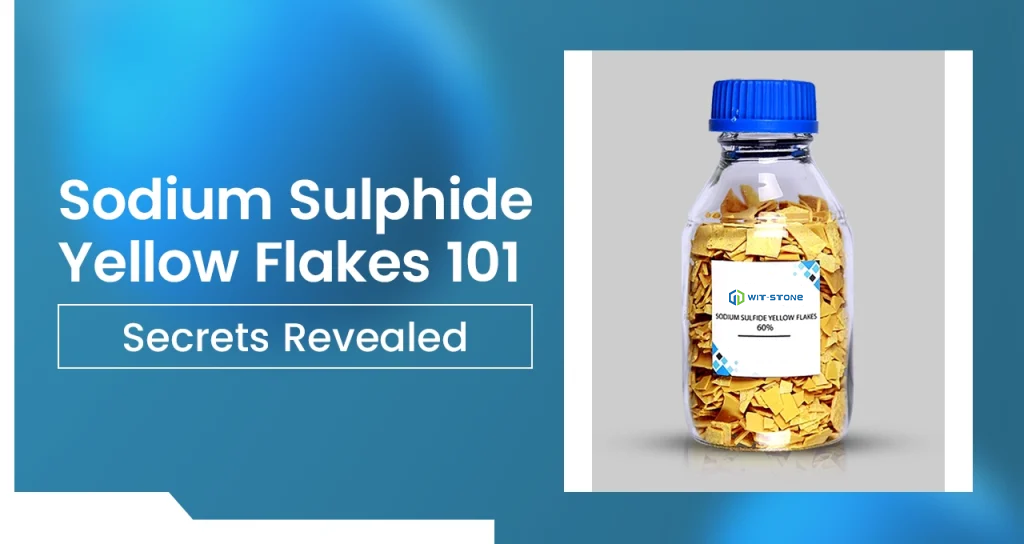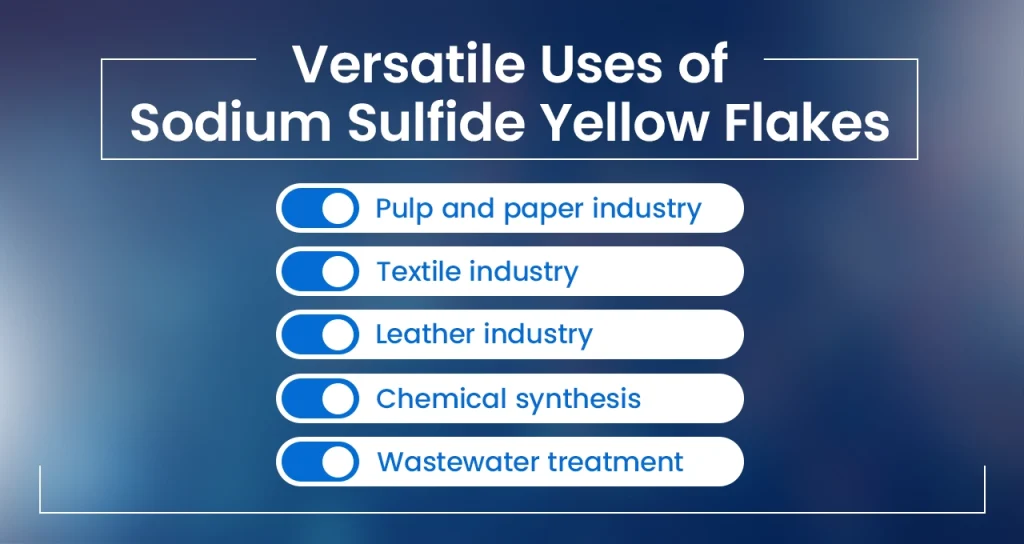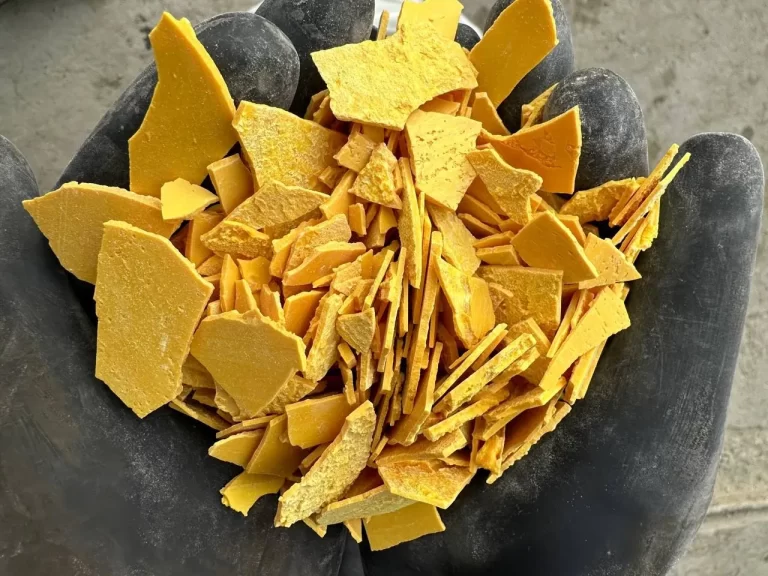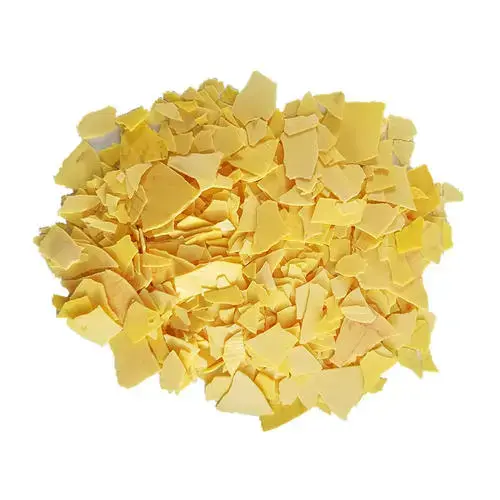Sodium Sulfide Yellow Flakes: Comprehensive Insights
Sodium sulfide yellow flakes are an indispensable industrial chemical known for their versatile applications across multiple sectors. These inorganic compounds, with a 60% concentration of sodium sulfide and an impurity level of only 10 parts per million (PPM), are widely sought after for their water-soluble, alkaline nature. Despite their usefulness, sodium sulfide flakes must be handled cautiously, given their distinct rotten egg odor when exposed to moist air and potential health hazards. This article delves into the primary uses, safety measures, and handling precautions of sodium sulfide yellow flakes to ensure safe and effective industrial application.

Applications of Sodium Sulfide Yellow Flakes
The utility of sodium sulfide yellow flakes spans industries ranging from textiles to metallurgy. Here are the major applications of this chemical compound:
1. Pulp and Paper Industry
Sodium sulfide plays a vital role in the pulp and paper industry, especially in the kraft process, where it helps break down lignin in wood. As a cooking liquor, it enables the efficient separation of lignin from cellulose, producing high-quality pulp and paper. This process not only enhances the durability of paper products but also improves their aesthetic quality.
2. Textile Industry
In the textile sector, sodium sulfide yellow flakes serve as a reducing agent during the dyeing and printing processes. By converting insoluble dyes into soluble forms, this compound ensures even penetration of color onto fabrics, leading to vibrant and long-lasting hues. It is particularly useful in transforming organic dyes into reactive forms, making them suitable for various textile applications.
3. Leather Industry
The leather industry relies heavily on sodium sulfide flakes during the dehairing and tanning processes. This chemical efficiently removes hair, flesh, and other impurities from animal hides, facilitating smoother and higher-quality leather production. Its use streamlines the initial stages of leather processing and reduces the labor-intensive manual work traditionally required.

4. Wastewater Treatment
Heavy metal contaminants, such as cadmium, lead, and copper, are common in industrial wastewater. Sodium sulfide yellow flakes effectively neutralize these toxic metals by forming insoluble metal sulfides, which can be easily filtered out. This process not only reduces environmental pollution but also ensures compliance with stringent wastewater management regulations.
5. Chemical Synthesis
In chemical manufacturing, sodium sulfide acts as a key precursor for synthesizing various compounds. Its high solubility in water makes it ideal for applications such as converting halides to sulfides, reducing nitro compounds to amines, and facilitating metal sulfide reactions. The versatility of sodium sulfide ensures its widespread use in laboratories and industrial chemical processes.
6. Mining and Metallurgy
In the mining and metallurgy industries, sodium sulfide flakes are used to enhance the extraction of precious metals. By acting as a flotation agent, the compound improves the separation of valuable ores from impurities, boosting efficiency in ore processing.
7. Other Applications
Additional uses of sodium sulfide yellow flakes include:
- Water Purification: Acts as an oxygen absorber to prevent oxidation.
- Detergent Production: Contributes to the formulation of industrial detergents.
- Pigment Manufacturing: Serves as an ingredient in high-quality pigment production.
- Paints and Coatings: Enhances the stability and properties of industrial paints.

Safety Precautions for Handling Sodium Sulfide Yellow Flakes
The proper handling of sodium sulfide flakes is essential to prevent accidents and minimize environmental harm. Industrial users must adhere to the following safety guidelines:
1. Personal Protective Equipment (PPE)
Workers should wear appropriate PPE, including gloves, lab coats, safety goggles, and respiratory masks, especially when handling large quantities in poorly ventilated areas.
2. Storage and Handling
Sodium sulfide flakes should be stored in airtight containers, away from moisture, acids, and oxidizing agents. Properly labeled storage areas are crucial to prevent accidental exposure or chemical reactions.
3. Waste Disposal
Dispose of sodium sulfide flakes and related waste materials according to local regulations. Proper disposal prevents contamination of soil and water sources, ensuring environmental safety.
4. Emergency Procedures
In case of spills or exposure:
- Avoid direct contact by using spill containment kits and protective tools.
- Ventilate the area to dissipate any gases formed due to chemical reactions.
- Seek medical assistance immediately if exposure leads to skin irritation, redness, or flaking.
Failure to handle sodium sulfide flakes correctly can result in severe consequences. For example, exposure to acids can release hydrogen sulfide gas, a highly toxic substance that poses a serious health risk.

Environmental Impact and Regulatory Compliance
As industries strive for sustainability, the environmental impact of sodium sulfide use must be carefully managed. This compound, when improperly disposed of, can lead to water and soil contamination. Industrial operators must implement effective wastewater treatment systems and comply with environmental regulations to mitigate these risks.

Conclusion
Sodium sulfide yellow flakes are a cornerstone of modern industry, with applications ranging from paper manufacturing to wastewater treatment. Their versatility and effectiveness make them indispensable for industrial processes, yet their handling demands utmost care. By following appropriate safety measures and adhering to environmental regulations, industries can harness the benefits of this chemical while minimizing risks.
When sourcing sodium sulfide flakes, partnering with a reliable supplier ensures access to high-quality products with minimal impurities. Companies like Wit-Stone provide premium-grade sodium sulfide yellow flakes, tailored to meet diverse industrial needs, guaranteeing performance and safety in every application.
You can place an order or ask any questions, please feel free to contact at feronia@wit-stone.com | +86-15655559799
Resource Link: More About Sodium Sulfide Flakes



